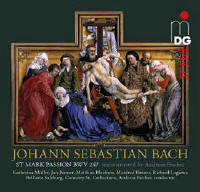Reviewer: James
A. Altena
Reconstructions of Bach’s St.
Mark Passion are now becoming a dime a dozen. I extensively discussed the
existing situation in a dual review of recordings by Jörg Breiding and Ton
Koopman in 38:2 (2014), and supplemented that in reviews of additional new
recordings by Markus Teutschbein and Jordi Savall in 39:1 and 43:1,
respectively. Essentially, I concluded that Breiding’s set had rendered all
previous efforts obsolete, with Teutschbein being a major new entry as the
premiere recording of the Grychtolik reconstruction of Bach’s 1744 revision,
and Koopman’s superb but idiosyncratic version being sui generis.
Now, conductor/organist/bass soloist Andreas Fischer has put his oar into
these waters with his own reconstruction. He makes the sweeping declaration
that all past attempts have been unsatisfactory, either because the
reconstructed recitatives (spoken instead of sung, composed in a modern
idiom, or borrowed from Reinhard Keiser’s St. Mark Passion) are at too far a
variance from Bach stylistically, or because Fischer deems Grychtolik’s
solution of adapting recitatives from the St. Matthew Passion for an ersatz
“small” St. Matthew Passion to be objectionable. Fischer therefore states
that the aim of his own completion is “to achieve a close approximation to
Bach’s personal style through exclusive use of his own compositions (except
the St. Matthew Passion), and thus to come closer to the hitherto missing
qualitative and stylistic uniformity of previous performing versions. This
methodologically unprecedented attempt is a novelty, especially as regards
the recitatives.” Unfortunately, Fischer provides no details whatsoever as
to what he has supposedly done instead. In particular, if he has drawn on
Bach’s own compositions other than the St. Matthew Passion for setting the
recitatives, from what works has he made those adaptations instead?
Suffice it to say that I am
unimpressed by Fischer’s rhetoric. As for his recitative settings, they seem
plausible enough, but not a revolutionary breakthrough. Unfortunately, it’s
hard to make a proper judgment here because the performance is so poor.
First, Fischer’s tempos are suffocatingly laborious; his performance is a
good 20 minutes longer than that of rival versions, meaning it is almost 20
percent slower.
Second, his soloists are equally bad. Matthias Bleidorn as the Evangelist
and tenor soloist is simply wretched, with an irritatingly nasal voice and
severely defective intonation; Richard Logiewa as Jesus has a gritty,
diffuse, wobbly bass; soprano Katherina Müller has an unpleasant edge to her
voice; male alto Jan Börner is a hooty, third-string specimen of that
species; only bass Manfred Buittner acquits himself well in his two arias.
Third, the orchestra is of the second rank as well, as exemplified by some
less than attractive oboe playing. At least the chorus sings well, and the
whole is well recorded, with MDG providing detailed notes and a complete
German-English libretto. Forget about this misbegotten enterprise and stick
with Breiding, Teutschbein, and Koopman.
Fermer la fenêtre/Close window
|




